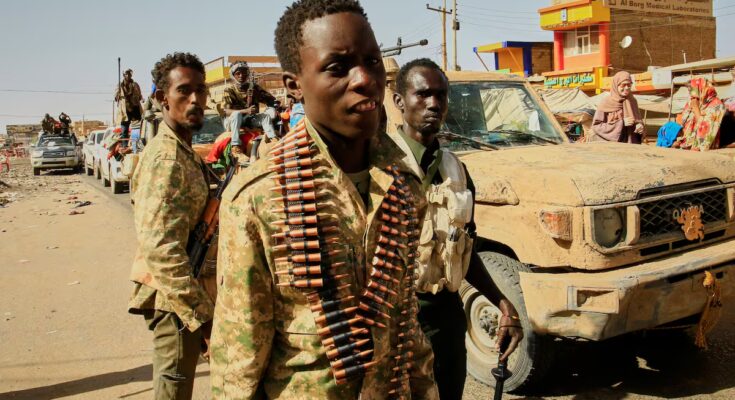After making sure control of almost the entire Darfur region with the atrocious capture of the city of El Fasher Since late October, Sudan’s paramilitary Rapid Support Forces (RSF) are now focusing their efforts on expanding their control over the vast Kordofan region in the south-central part of the country, where the regular army is trying to defend its positions. The escalation of violence in the area, where new atrocities against the civilian population have occurred, comes amid a renewed diplomatic offensive promoted by Egypt and the United States to try to reach a humanitarian ceasefire.
One of the Rapid Support Forces’ current objectives is the besieged city of Babanusa, the last bastion of the regular army in Western Kordofan, one of the three states that make up the region and on the border with Darfur. Since the capture of El Fasher – where around 2,000 people were massacred – the paramilitaries have dedicated themselves to this front and subjected the soldiers entrenched inside to incessant attacks. The army supplies its troops by air and strikes rebels with drones, but its situation becomes more precarious every day. Local activists say that, after two years of siege, practically the entire population of Babanusa, around 177 thousand people, have abandoned the city.
Another RSF target is the city of Dalang, the second largest in South Kordofan. On this front the paramilitaries act together with another armed rebel group very present in the area, the Northern Sudan People’s Liberation Movement, and both have mobilized fighters who in recent days have advanced to locate a few kilometers from the city, which has also been under siege since the end of 2023. Last Friday, artillery attacks by the rebels reached the main hospital in Dalang and killed six people, according to the World Health Organization (WHO).
The intensification of attacks and the siege in Dalang are also worsening the humanitarian crisis affecting the city, marked by a profound shortage of medicines and food. The only other city in Southern Kordofan with which Dalang remains connected is the state capital, Kadugli, where a famine was declared in early November and is likely to spread to Dalang. The current rebel offensive in the city, which like Kadugli is ethnically diverse but has a Nuba majority, raises fears of new atrocities by groups allied with the Rapid Support Forces against the fighting tribes.
At the same time, the RSF is trying to weaken the Army’s defenses in El Obeid, the capital of North Kordofan, the main point of support towards the west of the country and an important defensive line of the national capital, Khartoum. While paramilitaries have not yet attacked this city, they have captured some surrounding locations in recent weeks and in early November killed at least 40 people in a drone attack on a funeral on its outskirts. The army responded to the threat by fortifying El Obeid, sending military reinforcements and declaring general mobilization.
The advance of the Rapid Support Forces in Northern Kordofan was accompanied, as has happened systematically in their offensives since the beginning of the warof massacres against the civilian population. One of the most violent incidents occurred in late October in the town of Bara, north of El Obeid, where rebels killed dozens of people, according to the United Nations High Commissioner for Human Rights. Local media also reported a high number of missing people and multiple cases of sexual violence.
“In Bara they committed real atrocities, including extrajudicial killings of hundreds of people, after taking control of the city, and they also looted the market in (near) Um Haj Ahmed,” says a member of Emergency Lawyers, an independent Sudanese legal group, on condition of anonymity for security reasons. “Furthermore, the indiscriminate bombing of El Obeid and the brutality of the attacks in Bara and El Fasher have caused widespread panic among the population and a new wave of displacement,” he notes.
The United Nations High Commissioner for Human Rights, Volker Türk, also warned this Friday, in a session of the Human Rights Council convened to discuss the situation in El Fasher, of the risk of a repetition of the atrocities perpetrated in Darfur in Kordofan. “All the signs are there: bombings, blockades, people forced to leave their homes, a vile disregard for the lives of civilians,” warned the Austrian lawyer, who stressed that international law “must not be trampled upon” in the eyes of the world.
Diplomatic efforts
El Fasher’s atrocities and the deepening fracture in Sudan have prompted a new diplomatic offensive, led by the United States and Egypt, to try to reach a temporary ceasefire that would pave the way for opening a political path between the paramilitaries and the Army. The rebels assure that they would accept the plan, even if in the initial stages of the war they violated all the truces, while the military is more reluctant. For now, these efforts have not reduced the violence and the two sides appear determined to broaden their positions as much as possible before approaching any kind of agreement.
Behind this renewed diplomatic push is, in the case of the United States, President Donald Trump’s advisor on African affairs, Massad Boulos, who said on social media on Wednesday that a “firm text for a truce” had been presented and urged the warring parties to “immediately” accept and implement the humanitarian proposal. In Cairo, the new impulse comes after the latest military developments confirmed the inability of the Sudanese army, its main ally, to forcefully regain control of the entire country After the progress made in the last year, including the capture of Khartoum.
In recent months, diplomatic efforts for Sudan had been channeled through the quartet of the United States, Egypt, Saudi Arabia and the United Arab Emirates. However, the Sudanese military government categorically rejects the participation of Abu Dhabi which, despite officially denying it, is the Rapid Support Forces’ main foreign ally and has provided them with extensive military and political support. In statements to the press on Tuesday, US Secretary of State Marco Rubio called for “cutting” this supply of weapons and support to the rebels and admitted he knew “who the parties involved are”, but avoided publicly mentioning the United Arab Emirates, a close ally of Washington.


